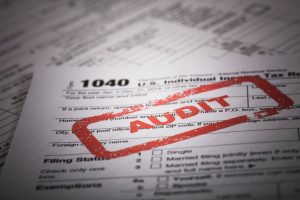
IRS ADVISOR—
Jan. 29, 2019, at 2:56 p.m.By Susannah Snider, Senior Editor, Personal Finance What is an IRS audit?
An IRS audit takes place when the Internal Revenue Service chooses to review a taxpayer's accounts to verify that tax laws are being followed. Audits aren't terribly common: Only 0.6 percent of individual returns were examined in the 2017 fiscal year,
according to the IRS. But filing your return completely, accurately and honestly can reduce your chances of being pinpointed and increase the odds of a favorable outcome. Read on for nine potential audit triggers.
You earned a lot of money.
According to 2017 fiscal year statistics from the IRS, individual filers who made between $200,000 and $1 million were audited at a 0.8 percent rate. If they were business owners, that rate was 1.6 percent. Those earning more than $1 million were audited at a 4.4 percent rate. If you're a high earner, be aware that you may hear from the IRS. Consider using some of that income to
hire a good tax preparer.
You aren't reporting cryptocurrency.
"Cryptocurrency is going to be an emerging issue with the IRS," says Phyllis Jo Kubey, enrolled agent and certified financial planner in New York City. "A lot of people don't know that when they buy something with cryptocurrency, it’s a taxable transaction." If you're receiving
bitcoin as income or successfully mining it, for example, these transactions may need to be reported. The IRS receives information from digital currency wallet Coinbase and may apply increased scrutiny to your tax return if it doesn't reflect the data provided.
You failed to report taxable income.
"Unless something is specifically exempt from being taxable income, it is income and you're supposed to report it," Kubey says. The IRS gets its own copies of the 1099 and W-2 income forms you have received and may notice your omissions. Track down any tax forms that have gotten waylaid or lost in the mail and contact a tax preparer if you're not sure about which earnings count as taxable income.
You made typos or a math error.
It might be an honest mistake, but if something looks fishy, such as an incorrect Social Security number or calculations that don't add up, you may bring on additional scrutiny from the IRS. Be careful and check your work twice when
filing taxes.
You are self-employed.
Business owners may attract additional scrutiny from the IRS. Uncle Sam tended to examine the returns of self-employed filers at higher rates than it did comparable nonbusiness filers, according to IRS data. If you claim self-employment income and deductions through your individual income tax return, double- and triple-check your figures and keep a pristine paper trail to back up
tax deductions.
You have three consecutive years of business losses.
For self-employed filers who have reported losses for three consecutive years, "that does create a potential audit risk because the IRS will challenge that to see if it’s a business or it's a hobby," says Dave Fultz, a partner with Barsz Gowie Amon & Fultz, located outside Philadelphia. The important difference: "A loss from a business is deductible. A hobby loss is not," he says.
You use round numbers.
Be specific when itemizing various expenses, Fultz says. If the numbers all end in a double zero, it can look fishy. "The IRS does look at that, and they might feel you don't have documentation for your expenses," he says. Again, keep good records and be specific when writing off expenses.
You deduct 100 percent of a car for business use.
When listing the business use of a work-related automobile, the IRS knows that it's unlikely that you're using it 100 percent for work. For example, if you use it for commuting, that expense isn't deductible. There are myriad mobile apps and tools to help you
track mileage. Maintain your paper trail.
Something doesn't add up.
If you're claiming large deductions on a small salary, for example, you could open yourself up to additional verification from the IRS. "If you have expenses that are proportionately unusual compared with income on your tax return, it's more likely to promote scrutiny," Kubey says.
The bottom line
As long as you file taxes accurately and keep good records, you shouldn't fear a tax audit. "At the end of the day, honesty is the best policy," Fultz says. "As long as you have support for everything you put on the return, even if you are audited, it’s OK." If you're concerned about your tax return or the paperwork involved, meet with a good tax preparer and make sure you keep accurate records throughout the year.
Tax audit triggers
To recap, here is what triggers a tax audit:
- You earned a lot of money.
- You aren't reporting cryptocurrency.
- You are self-employed.
- You failed to report taxable income.
- You made typos or a math error.
- You have three consecutive years of business losses.
- You use round numbers.
- You deduct 100 percent of a business car.
- Something doesn't add up.
Remember that audits are rare, and good record keeping will help you endure the audit process.
Updated on Jan. 29, 2019: This story was previously published on Feb. 4, 2015, and has been updated with new information.
 IRS ADVISOR—Jan. 29, 2019, at 2:56 p.m.
IRS ADVISOR—Jan. 29, 2019, at 2:56 p.m.